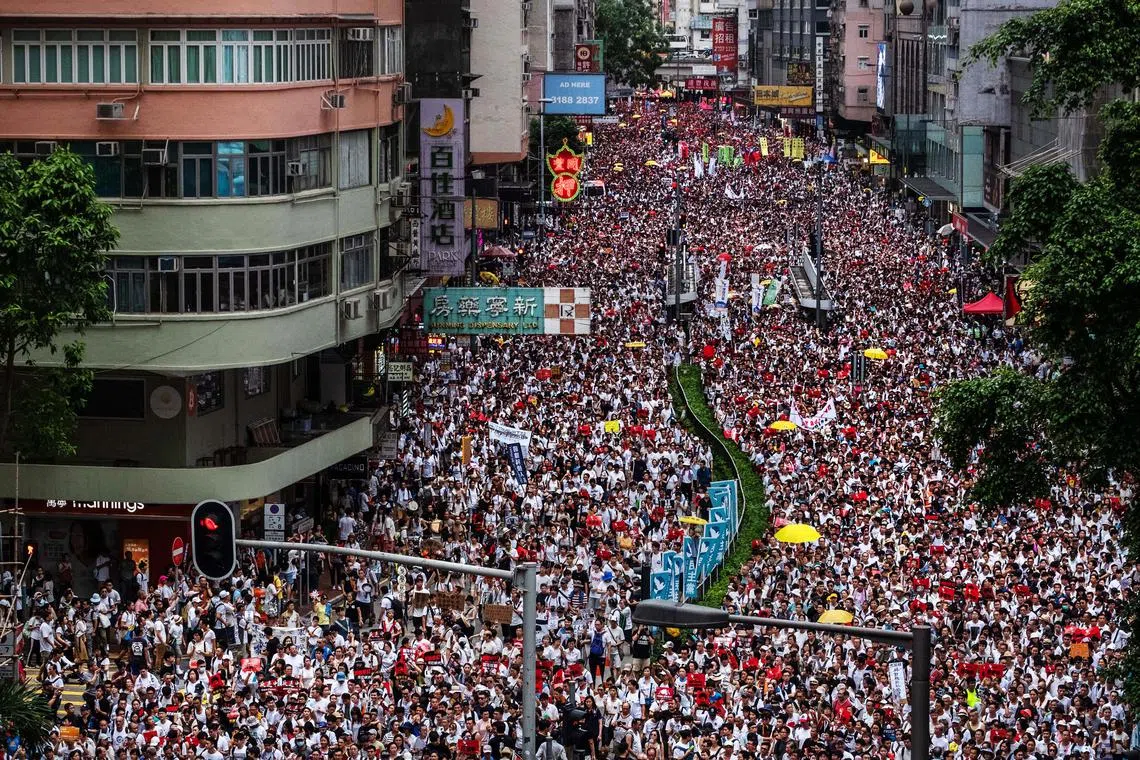Hong Kong court to rule in major national security case involving 2019 democracy protests
Sign up now: Get insights on Asia's fast-moving developments

Millions took to the streets in Hong Kong in 2019 and 2020 to protest against what they saw as China’s growing interference in the city’s affairs.
PHOTO: NYTIMES
Follow topic:
HONG KONG – A Hong Kong court will deliver verdicts this week in the biggest case brought against pro-democracy campaigners since China imposed a national security law to crush dissent.
Forty-seven people from a cross-section of Hong Kong’s then opposition face life in prison on subversion charges over political activities in 2020, following democracy protests that saw millions take to the streets
Thirty-one members of the group, which includes democratically elected lawmakers, union members and academics, have pleaded guilty.
Three judges handpicked by the government to try national security cases are scheduled to deliver verdicts against the remaining 16 on May 30 and 31.
Cases under the national security law and related crimes, such as sedition, have a 100 per cent conviction rate, with 114 people found guilty since the legislation came into force in 2020.
Rights groups say the law undermines civil liberties that were meant to be enshrined under a 1997 agreement to hand the former British colony back to China.
The government says the law is needed to crack down on major crimes such as collusion and secession after the massive and at times violent pro-democracy demonstrations in 2019.
Beijing’s Hong Kong Affairs Office said the defendants staged “a severe challenge against Hong Kong’s constitutional order” by organising and joining an unofficial primary election in July 2020.
The primary was meant to shortlist some pro-democracy candidates for the city’s official legislature election, which was later cancelled by the authorities.
US ‘closely watching’ case
Prosecutors said the defendants planned to seize a legislative majority to force the Hong Kong authorities to meet five demands raised by protesters in 2019.
The demands included launching an independent inquiry into alleged police brutality against protesters and gaining universal suffrage for both the city’s leader and lawmakers.
Prosecutors also alleged that the defendants intended to force the chief executive to step down by “indiscriminately” vetoing the budget.
Most of the defendants in the case have been in jail since the group was first brought to court in March 2021.
The 16 who pleaded not guilty faced a 118-day trial that was conducted without a jury, departing from the city’s 178-year-old common law tradition.
Sentences in the case will not be this week, but expected in 2024.
The case has been closely watched by the international community, with the United States and other Western nations criticising China for quashing democracy in Hong Kong.
The arrest of the defendants at dawn on Jan 6, 2021 – including legal scholar Benny Tai and prominent lawmakers “Long Hair” Leung Kwok-hung and Claudia Mo
The US consul-general in Hong Kong, Mr Gregory May, in May said Washington will be “closely watching the expected verdicts... and their sentencing”.
A group of United Nations human rights experts said in October they were “very troubled about the use of mass trials” in cases under the national security law. AFP

